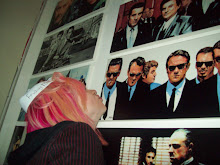
I thought I’d heard it all before with cinema history, domestic and foreign, silent and talkie. I dreaded having to see films like Metropolis again because my slightly-younger self hadn’t liked them. However, this term I’ve learned that I knew nowhere near as much as I thought.
Keeping up with blogging has been one area in which I’ve noticed a real difference. My blogs from this year read so differently to earlier posts: I know that I wasn’t looking at what was important in forming a good critical opinion.
Our assignment on production values really helped me to think more like this. We had to choose any film nominated for a 2008 Best Art Direction Oscar. I chose The Dark Knight, a much-viewed favourite. For once though, I had to look at it constructively. By taking it all apart and looking at components individually, I feel like I got a better understanding of the whole film.

It was also really good preparation for our research assignment. I didn’t feel as daunted by the prospect of research as I might have, because I knew what to look for (eventually). After changing from my question, I chose to analyse the opening scene of Natural Born Killers with relation to cinematography. It was by far the most challenging thing we’ve done this year. I even went to Glasgow University library on a few occasions, whereas before I’d have probably just researched online. I’m not saying that’ll be something I keep up, but I felt like I’d actually put the work in.

I tried to keep writing more thoroughly about what I watched at home, and one in particular was Inglourious Basterds. While I was researching it, I read about the influence of the French New Wave (or Nouvelle Vague) on Quentin Tarantino. Coincidentally, we’d gotten to post-war Europe in our classes on ‘world cinema’, which included watching Rome Open City and 400 Blows. Stylistically they’re so different to anything that had come out of Hollywood, and I noticed similarities in Tarantino’s work.
Another facet was British New Wave, something which really struck a chord. The films which came from it, like The Loneliness of The Long Distance Runner, aren’t as ’famous’ as Godard or Truffaut. However, they have an urgency and vitality of their own. Or I imagine they would have, at the time.

The echoes of the final film, The Lives of Others, are still ringing in my ears. It was a beautiful example of modern German cinema: it proved there is no language barrier when a film is truly great. I’d previously watched Goodbye Lenin and Downfall, and I think there are a lot of really interesting films coming from the country now. Watching this film was, for me, the best note to end on. It put similar films into context, and having learning the history- of where they came from and what they represent- made the eventual viewing so much more satisfying


I find it difficult to find political films that I genuinely enjoy. The Lives of Others is an incredible specimen in this respect. It interacts with the best of humanism, addressing the film's protagonists beyond professional and ethical stereotypes. Goodbye Lenin plays more with Eastern German retro aesthetics - the shift occurred pretty quickly in the 90s, don't you think?
ReplyDeleteI'm the same in that I don't tend to enjoy films that are "POLITICAL"... What I liked about The Lives Of Others was that the political situation was a backdrop for character development, and allowed us a deeper understanding of the relationship dynamics between the characters- particularly those who never meet. Their are some stereotypical aspects in terms of character on either side but again, these only serve as a basis for character growth throughout the course of the film. I think what I find most fascinating about this, and Goodbye Lenin, is that the political aggravation and change occurred within or just before my lifetime, although when I was old enough to understand it, Germany was united and there was little mention of the East/West divide (or I didn't know much of it anyway)... it didn't seem to take them long to shift from Stasi to Starbucks.
ReplyDelete